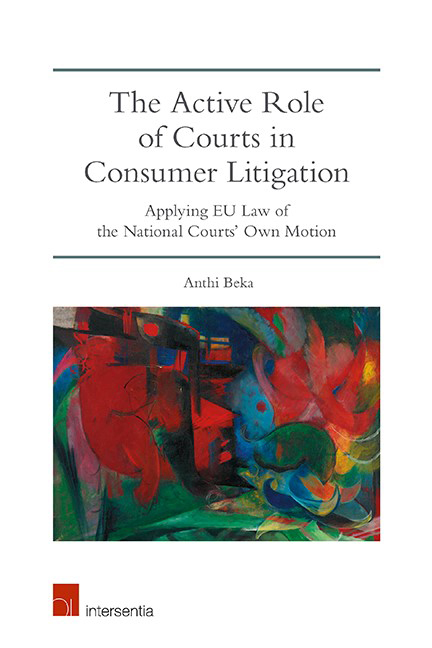Book contents
- Frontmatter
- Dedication
- Foreword by Professor Elise Poillot
- Introduction by Judge Etienne Rigal
- Acknowledgments
- Contents
- List of Cases
- List of Abbreviations
- Introduction
- PART I THE DOCTRINE OF THE ACTIVE CONSUMER COURT IN CONTEXT
- Chapter 1 Setting the Scene: Europeanization of Consumer Procedural Law and Judicial Protection of Union Rights
- Chapter 2 The General Rule on the Application of Union Law by National Courts of Their Own Motion
- Chapter 3 National Perspectives on the Application of Union Law by National Courts of Their Own Motion
- PART II THE EMERGENCE AND DISTINCTIVE FEATURES OF THE ACTIVE CONSUMER COURT DOCTRINE
- Final Conclusions: Changing the Narrative and Moving Forward
- Bibliography
- Index
- About the Author
Chapter 3 - National Perspectives on the Application of Union Law by National Courts of Their Own Motion
from PART I - THE DOCTRINE OF THE ACTIVE CONSUMER COURT IN CONTEXT
Published online by Cambridge University Press: 31 January 2019
- Frontmatter
- Dedication
- Foreword by Professor Elise Poillot
- Introduction by Judge Etienne Rigal
- Acknowledgments
- Contents
- List of Cases
- List of Abbreviations
- Introduction
- PART I THE DOCTRINE OF THE ACTIVE CONSUMER COURT IN CONTEXT
- Chapter 1 Setting the Scene: Europeanization of Consumer Procedural Law and Judicial Protection of Union Rights
- Chapter 2 The General Rule on the Application of Union Law by National Courts of Their Own Motion
- Chapter 3 National Perspectives on the Application of Union Law by National Courts of Their Own Motion
- PART II THE EMERGENCE AND DISTINCTIVE FEATURES OF THE ACTIVE CONSUMER COURT DOCTRINE
- Final Conclusions: Changing the Narrative and Moving Forward
- Bibliography
- Index
- About the Author
Summary
The Van Schijndel line of case law has demonstrated that the national procedural rules which reflect“ conceptions prevailing in most of the Member States as to the relations between the State and the individual” do not“ bend” before the enforcement of Union law. The question of the power of the courts to address certain issues of Union law of their own initiative touches upon the fundamentals of civil justice by“ cutting across,” as Simon Whittaker puts it,“ the existing national pattern of the relative roles of the parties and courts in determining the subject matter of the case, whether in fact or in law ”.
The leading procedural principles which determine the respective roles of the courts and the parties in civil adjudication are the principle of party presentation, according to which the delimitation of the ambit of the dispute belongs to the parties (principe dispositif – Dispositionsgrundsatz) and the principle of adversarial proceedings according to which the court decides on the basis of the materials which have been put forward and debated by the parties (principe de la contradiction – Beibringungsgrundsatz).
This chapter discusses the ex officio application of Union law from a domestic law perspective. It would be beyond the scope of the present work to elaborate upon all the details of the legal systems of Member States with respect to the division of roles between the parties and the courts However, as the Van Schijndel line of case law touches upon this issue, it is essential to adumbrate the theoretical assumptions underlying the principle of party presentation. Illustrations will then be drawn from the relative roles of the parties and courts in three jurisdictions – the English, the French and the German, with some references also to the Belgian and Luxembourg jurisdictions – in civil law adjudication with regard to points of mandatory Union law. The application of the consumer ex officio doctrine in national legal orders will then be examined in detail in Chapter 6.
- Type
- Chapter
- Information
- The Active Role of Courts in Consumer LitigationApplying EU Law of the National Courts’ Own Motion, pp. 77 - 120Publisher: IntersentiaPrint publication year: 2018



